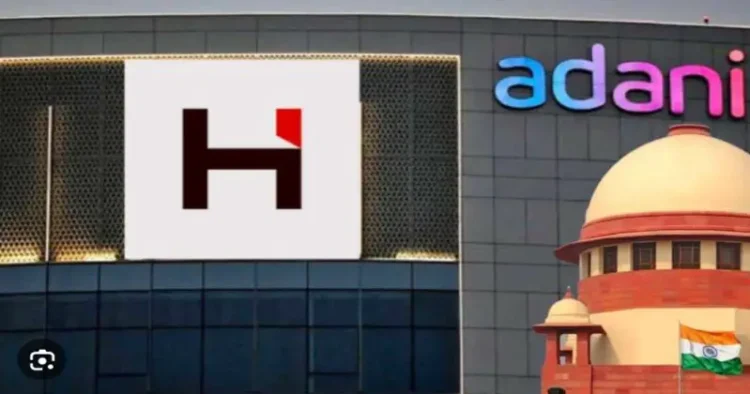The Supreme Court, led by Chief Justice of India DY Chandrachud and justices JB Pardiwala and Manoj Misra, has reserved its order on the matter concerning the Hindenburg report. The court emphasised that it cannot instruct the Securities and Exchange Board of India (SEBI) based solely on a media report.
During the proceedings, Advocate Prashant Bhushan, representing one of the petitioners, highlighted that the Hindenburg report contained several factual revelations. The court took note of this assertion but underlined that it couldn’t compel SEBI to take action solely based on media reports.
CJI DY Chandrachud remarked, “We do not have to consider it an ipso facto (by the fact itself) determination of facts and conclude that is not the true state of affairs…that is why we asked SEBI to probe. Also that entity is not before us.” The court asked Bhushan to apprise them from the report of what additional direction are required to be given to SEBI to improve the regulatory network.
Advocate Bhushan raised doubt on the SEBI roles and said “A lot of information was available to it in 2014. A formal letter was given by the DRI Chairman,” he said. Solicitor General Tushar Mehta submitted that this is what happens when one files affidavits before the highest court based on some random sources and apprised the SC that DRI concluded the proceedings in 2017.
The court also noted that DRI has concluded the proceedings in 2017. Supreme Court remarked to the lawyer appearing for the petitioner that it is easy to make allegations and one must be also very careful. “We are not giving a character certificate to anyone,” the court said.One of the lawyers said – he is demanding an investigation against SBI and LIC.
CJI DY Chandrachud remarked to the petitioner to show some responsibility as it is not some debate in a college and they are before the court. “You realise the consequence of a direction against SBI and LIC,” SC remarked as it noted that the petitioner has not shown any material.
SC remarked that SEBI, a statutory body looks into stock market frauds.Supreme Court sought to know from the petitioner where is the material before them to show that SEBI had not acted properly. The apex court remarked that they do not think one can ask a financial regulator to take something printed in the newspaper, adding that this does not discredit SEBI. “Should SEBI now follow journalists?” SC remarked.
The court said that it cannot ask a statutory regulator to take as a gospel truth something that is published in the newspaper. The petitioner’s lawyer raised various other media and other reports including the Organized Crime and Corruption Reporting Project (OCCRP). SC remarked how such reports are of any evidentiary value.”We cannot make an assumption that it is credible or lacking in credibility,” SC remarked
SG Tushar Mehta says that there is a growing tendency of planting stories outside India to influence decisions within India and one example is the OCCRP report. Petitioner’s lawyer pointed out the committee report which notes a chicken-and-egg situation as the rules have been amended regarding the beneficial owner
SC said “We are not experts to sit on their judgement on why they felt that certain modifications were necessary. If we now find that rules to be modified, we can issue a direction with them.”
The court after the matter at length indicated it may pass some additional directions for the SEBI.
Earlier, the Securities and Exchange Board of India (SEBI) filed a status report before the Supreme Court apprising it that out of 24 investigations arising out of the Hindenburg report, 22 are final in nature and 2 are interim in nature.
The investigation was carried out in compliance with the directions of the top court’s order dated March 2, 2023, SEBI has investigated 24 matters. In the mid of May, the top court gave three months more time to the Securities and Exchange Board of India (SEBI) to conduct a probe into the Hindenburg report SEBI was granted time till August 14, 2023, to conduct the probe.
On March 2, the apex court directed the capital market regulator SEBI to investigate any violations of securities law by the Adani Group in the wake of the Hindenburg report, which led to a massive wipeout of more than USD140 billion of the Adani Group’s market value.
Supreme Court, on March 2, set up an expert committee on the issue arising from the Hindenburg Research report on Adani Group companies. The committee will consist of six members, headed by former apex court judge Justice AM Sapre.
The top court had then asked SEBI to file a status report within two months. The apex court was then hearing petitions pertaining to the Hindenburg report, including the constitution of a committee relating to regulatory mechanisms to protect investors’ interests.
The January 24 Hindenburg report alleged stock manipulation and fraud by the conglomerate.
The Adani Group has attacked Hindenburg as “an unethical short seller”, stating that the report by the New York-based entity was “nothing but a lie”. A short-seller in the securities market books gains from the subsequent reduction in the prices of shares.



















Comments